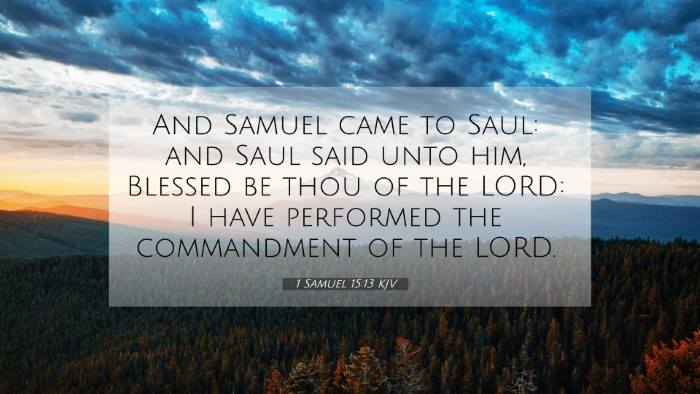Understanding 1 Samuel 15:13
Verse Context: 1 Samuel 15:13 states, "And Samuel came to Saul; and Saul said unto him, Blessed be thou of the Lord: I have performed the commandment of the Lord." This verse embodies a moment of tension between divine command and human action. It is pivotal in understanding the consequences of disobedience and the relationship between God and His chosen leaders.
Commentary Insights
This verse provokes thought about the nature of obedience to God and the often complex relationship between leaders and divine expectations. Drawing insights from Matthew Henry, Adam Clarke, and Albert Barnes, we can deeper our understanding of this scripture.
Matthew Henry's Commentary
Obedience vs. Lip Service: Henry comments that Saul’s proclamation of having fulfilled God’s command is indicative of human tendencies to self-deceive. Saul, instead of humbly acknowledging his failures, perceived himself as righteous. This highlights the theme of what it truly means to obey God.
Albert Barnes' Analysis
Self-Deception: Barnes emphasizes that Saul believed he had followed God’s command to the letter, demonstrating how leaders can sometimes misinterpret their actions. Saul fails to recognize the critical spiritual implications of his actions, illustrating how obedience to God involves both external actions and internal heart alignment.
Adam Clarke's Insights
Consequences of Disobedience: Clarke notes that Saul's actions set the stage for his eventual downfall. He portrays Saul's attitude as one of arrogance, failing to grasp the seriousness of God's commands. Clarke stresses that partial obedience is indeed disobedience, urging readers to fully commit to God’s will.
Thematic Connections
- Authority: This verse highlights the challenges of leadership under divine authority.
- Human Fallibility: Saul represents the human tendency to justify actions rather than submit to divine truth.
- Divine Command vs. Human Action: The tension between what God commands and what humans perceive they are doing creates an ongoing Biblical dialogue.
Related Bible Verses
This verse can be cross-referenced with the following scriptures, illustrating the interconnectedness of Biblical themes:
- 1 Samuel 15:10-11: Details God's true feelings towards Saul's disobedience.
- Exodus 19:5-6: Discusses God’s covenantal expectation of obedience.
- Deuteronomy 28:1-14: Explains the blessings associated with obedience.
- James 1:22: Urges believers to be doers of the word, not hearers only.
- John 14:15: Jesus expands on the theme of love and obedience.
- Galatians 5:7-8: Encourages believers to remain steadfast in their initial obedience to the Gospel.
- Matthew 7:21: The importance of doing God’s will as a demonstration of true discipleship.
Applying 1 Samuel 15:13 in Modern Faith
This scripture not only instructs on the importance of divine obedience but exhorts believers to maintain a posture of humility. It reminds readers that merely proclaiming faithfulness is insufficient without genuine action that aligns with God’s commands.
Tools for Further Study
- Bible Concordance: Use a concordance to find specific terms related to obedience and disobedience.
- Bible Cross-Reference Guide: A guide can help identify themes connecting Saul’s actions with similar narratives throughout scripture.
- Cross-Reference Bible Study: Engage in a study that highlights both Old and New Testament implications of obedience.
Conclusion
1 Samuel 15:13 serves as a poignant reminder of the complexity of obedience in the Christian life. It calls for self-examination to avoid the pitfalls of presuming one's own righteousness in the sight of God. This theme resonates throughout Biblical narrative, establishing critical connections between various scriptures that deal with obedience, the nature of leadership, and the expectations of God upon His people.















